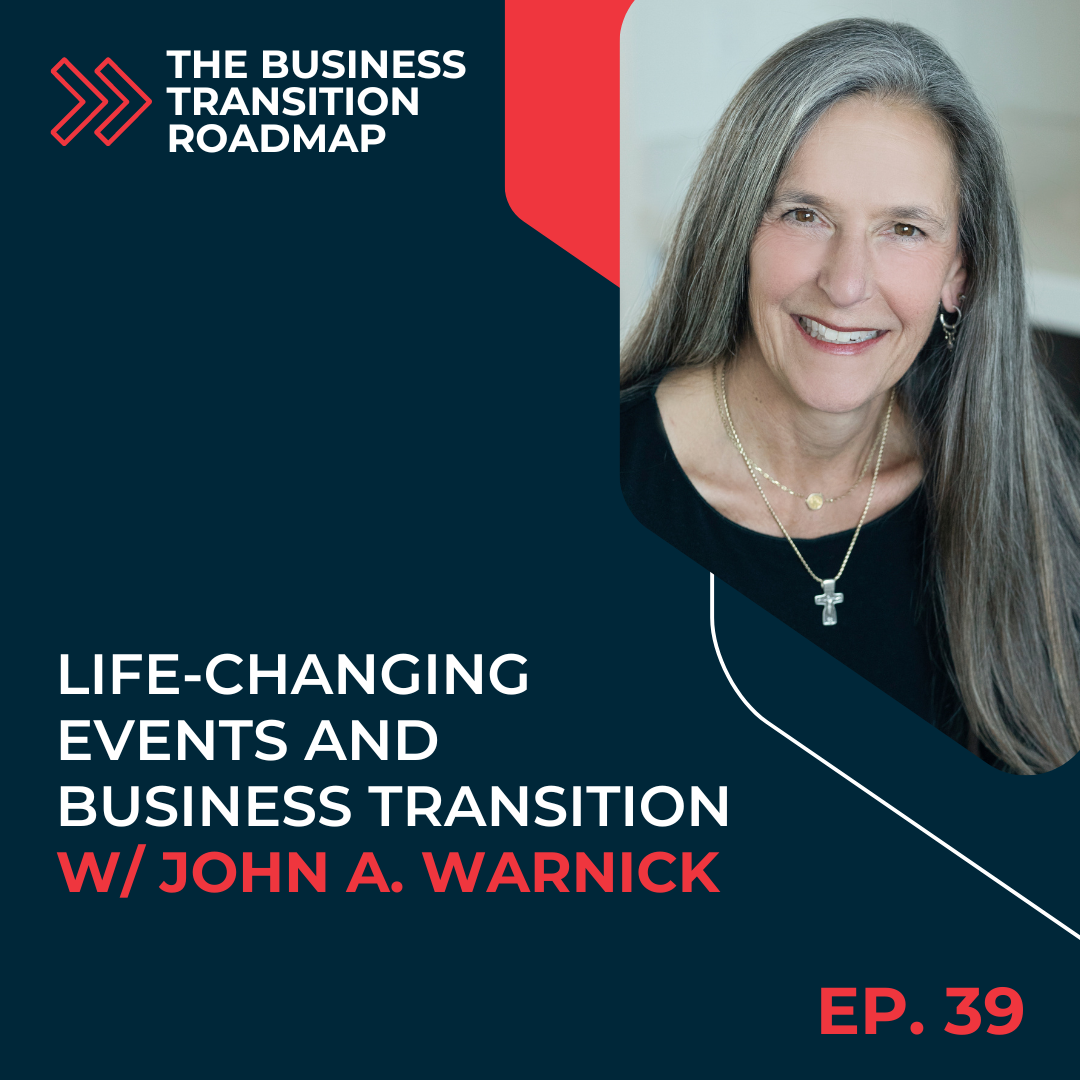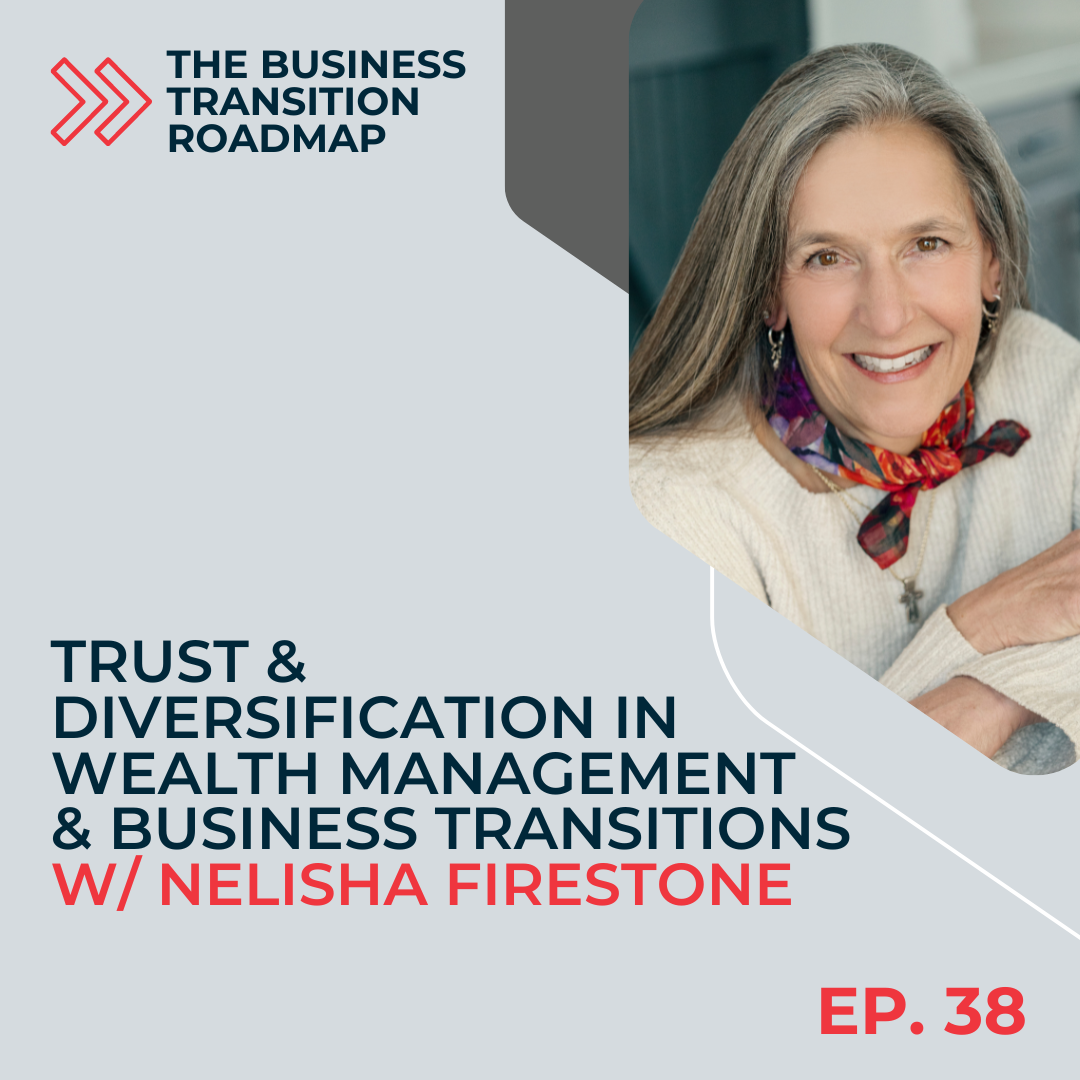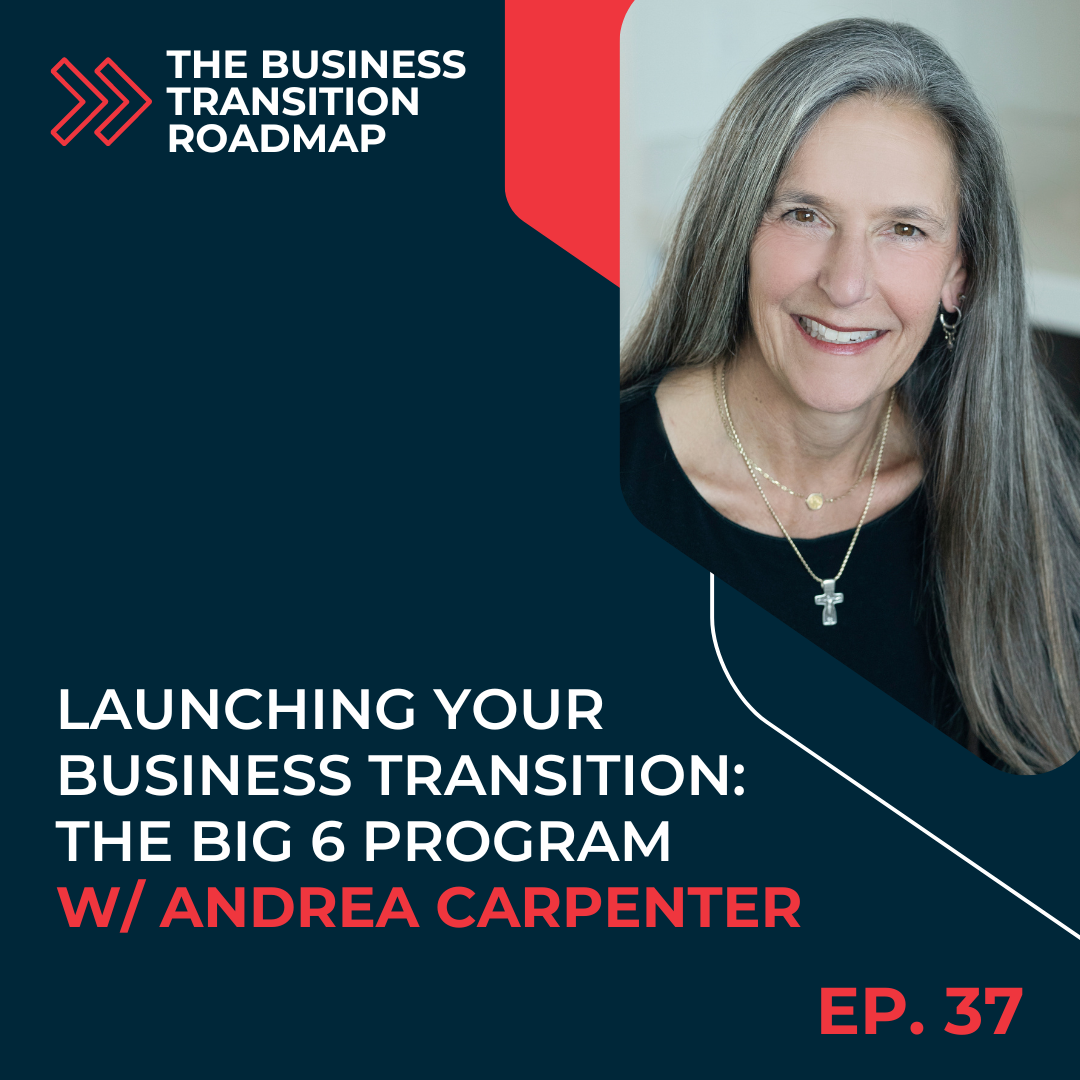Episode Description:
Trying to make things equal and fair is a tricky road to navigate when transitioning your business. As the owner, you may have a completely different perspective from the rest of the people in your business, so perception is key when you start a transition to ensure you keep up your relationships with those employees and place value in the things they care about. Tap or click the play button below to listen to: Understanding equality and fairness in business transitions.
In this episode, Elizabeth shares how you can create a positive perception from your employees and keep up your good relationships as you take them through your transition. The power is in your hands to create a path that not only gets you the things you want out of your business, but keeps everyone else feeling satisfied.
Connect with Elizabeth and the Transition Strategists:
Website: https://transitionstrategists.com/
Facebook: https://www.facebook.com/thetransitionstrategists
LinkedIn: https://www.linkedin.com/company/transitionstrategists/
This episode was produced by Story On Media & Marketing: https://www.successwithstories.com.
Understanding Equality and Fairness in Business Transitions Transcript
[00:00:00] Elizabeth Ledoux: Hi, and welcome to the podcast today. Today what we’re gonna be talking about is navigating the tricky road of equality and fairness, and this is a topic that we for sure will have other episodes in the future that we’ll be discussing this because it is such a big, big, big issue. For every business owner that I’ve ever worked with internationally, um, this is one that people really don’t get around and especially business owners who want to try to figure out how to put people first, who are trying to figure out how to, um, Gosh, have Thanksgiving, have Christmas, keep their relationships with their employees whole, um, keep their friendships.
[00:00:45] It, um, it really is one that dives deep because you’ve got two different aspects. You’ve got, um, the belief of the owner and them trying to do the best for the situation and the transition. And then you’ve got the belief of all the people who are being impact. by the equality and fairness decisions. So, uh, the perceptions make a big difference.
[00:01:12] So this is sort of hard and tricky to navigate, which is, um, yeah, why we called it what we did. So this is always the biggest, one of the biggest dilemmas for owners as they navigate, and it’s something that the owners strive for, people strive for. However, there is no sure. Sure. Like, yeah. Um, formula for.
[00:01:39] Fairness and equality. When we work with business owners, we start with helping them to understand what are their values? So how do they perceive equality and fairness? Doing kind of a deep dive into that and you can do some reflective work, um, just yourself on how do you perceive equality and fairness, what does that really mean to you?
[00:02:05] And, um, And how important is it to you in your world? How is important, how important is it to you and to others? So, The quality and fairness depends on the perspective. And I thought I would, um, give you a quick story. We’ll start with, um, it’s five kids and a father. So we’ve got five kids, two out of the business, three in the business, and we’ve got the dad.
[00:02:29] And I’m gonna give you a couple of different aspects to think about. Um, first of all is inside the business. So the, the three that are in the business are all son. And they happen to be in their, you know, late forties, early fifties. They’ve worked in the business for many, many years and the business has supported them and their families through the work that they’ve done.
[00:02:58] Only one of ’em had owned a home, made enough money to own a home, and they really had, they were very dependent on the dad’s decisions. How much money they made because the dad was in that controlling position, that c e o role, the dad years before, when the boys had started, decided that in order to be equitable and fair, that what he would do is he would pay them all the same amount of money.
[00:03:30] no matter what role they had, he would pay them exactly the same. And that kind of worked when they were younger because they didn’t have families and they weren’t supporting people like that, and their jobs were more aligned. But as they grew through the business, what happened is everybody got a raise.
[00:03:49] If one got a raise, they all got the raise, even though one was like C F O, and another one might have. a great salesperson, and another one might have been in the construction side and doing, you know, running a crew outside. So you can see there’s a little bit of diversity in their roles. However, they all got the same, they all were getting the same raises and they all were doing the same thing.
[00:04:18] When we started working with this company, what we found is the dad had dug himself a nice hole because he couldn’t figure out how to be equitable and fair. and Pay people differently for what they did. That was a real dilemma for him. So you can have equality and fairness inside the company. And the perspective was that he was very fair.
[00:04:44] Until they started doing different roles, and then what happened is the sons decided that it wasn’t okay and that they weren’t being treated fairly and they weren’t being treated equitably because they were doing work that all, all of the work was very different. So pull the whole thing apart, put it back together.
[00:05:04] Now they had incentive to do more because before they were just getting paid what they got paid. Why do more incentive to do more incentive pay? A reason to move up the ladder a way. Just like in our world, the regular world out there, the way to make choices and decide if I work harder, maybe I can make some more money.
[00:05:27] If I go back to school, maybe I can make first some more money. And so they had more control then or decision power over their behavior and their lives. So that’s a really good example of perception where equality and fairness started out with really great intentions and over the years turned into a huge dilemma that had to be unpacked and then put back together.
[00:05:54] Did it? Well, um, they’re still going to Christmas and having a good time as a family. Uh, was, there were some pretty hard conversations in that, in that dilemma. So, another. So we, that was, we’re just talking about equality and fairness inside the business with roles, who gets to do what and how much does everybody get paid when you think about external to the business.
[00:06:17] So let’s, let’s talk about equity cuz you know, shareholders someday I’ll talk to you about my, um, My business enterprise model that it’s basically a SWAT model, but it’s kind of fun because it’s got a lot of movement in it. Um, the shareholders sit on the outside of the business. They’re the investors in the business.
[00:06:37] And so when you start to, when you’re transitioning work and tasks and things like that, that’s all inside the business. , when you start to think about transitioning equity that’s outside the business. It’s just the investment money that the business is using in order to do what it needs to do and be in business.
[00:06:57] So same example, we’ll use the same family. You’ve got three kids inside the business working, and you’ve got two outside the business. So, , equality and fairness comes down to beliefs, right? In your thoughts on what’s okay and what’s not okay, what is, what’s fair and equitable and what isn’t. And again, there’s no formula for this, so, , is it right for this family to gift?
[00:07:28] Let’s say they have enough money external, they don’t need the money out of the business. Let’s just say that. Is it okay for them to gift 20% to all five kids, so they’re all in business together? Some people would go, oh my gosh, that’s terrible. I wouldn’t wanna do that. What a dilemma that could create.
[00:07:48] Because you’ve got three in the business that are active, two outside the business that aren’t doing anything, so how come they get ownership? Right? That’s that perspective, but, , the dad and mom think it’s pretty good because they were fair to everybody. Or do the three that are in the business get more of a percentage than the two outside the business because they’ve earned that maybe.
[00:08:14] Or did the two outside of the business not get any of the equity of the business because they have other lives and they’re doing other things, and the three that are working in the business should have control of their own destiny? Without having to make money for the other two. This is common and it’s a dilemma that many people run into, uh, with external owners.
[00:08:41] And this can happen. I’m giving you the family dynamic, but this can happen even in a partner dynamic where a partner who might be an older partner, longtime partner, , if you’re a longtime partner, you’re probably a little older in age anyway, but it could be a longtime partner and they’ve built and grown the business and they’re no longer active in the business.
[00:09:05] They really don’t even have a job anymore. They barely come into the office. , but they still own 20% or 30% or 40% of the business, and all these other people that have the other portion of the equity are working hard. So is it okay for that partner to be able to do that and reap the benefits, the dividends, the money, the extra money that the business makes, those distributions?
[00:09:30] Is it okay for that to happen or not? Does it cause chaos or. Um, frustration and conflict. So all of this has boils down to equality and fairness because in that example, with the partner who’s not doing as much in the company anymore, the younger partners, right, the newer partners, the ones that are still active in the business and engaged every day, see it as making money for potentially a guy or girl, lady who doesn’t really come to work very.
[00:10:04] Is that fair? Is that equal?
[00:10:10] As you walk through this equality and fairness situation, it’s very important for you to understand how you see equality and fairness. Like what are your values, your own beliefs and feelings about equality and fairness. Just doing a very deep dive, being very introspective about that. And one thing that I like to encourage is for you, if you have a significant other or a spouse, to explore what their belief is also, especially if it’s a family situation where you have children, um, because the equality and fairness issues bleed over into.
[00:10:55] family dynamics, um, just relationships in general. Friendships, and so it’s important that you’ve got other people’s perspectives so that you can bring that together and then offer a very solid reason for your decisions on how you. , your thoughts and your actions are gonna be equal and fair to those who are coming in or to those who are not included.
[00:11:25] Because some people will be typically excluded for some reason, whether it’s an employee, um, or whether it’s a family member. So the beginning is to do that deep dive and understand their belief systems and then, The next step is to start to explore intended consequences and unintended consequences. So what do you believe are gonna be the consequences of.
[00:11:55] Your decisions on equality and fairness, kind of like your plan of how you might distribute the equity, and also who might be in a job role, you know, A C E O, and who might not. So what do you expect? What are intended consequences? And we can’t see unintended consequences very well, of course, because they’re unintended.
[00:12:15] Um, however, by exploring not only your beliefs and your thoughts, but also by bringing in some kind of an advisor, somebody who’s done this over and over again for many years, it could be your CPA or lawyer, could be a consultant, kind of like our firm. It could be, um, gosh, even sometimes therapists have done a lot of work in this area, so very valuable.
[00:12:41] So what are those consequences that you believe might happen? And remember, those can be mindsets and those can be, um, dilemmas that are not true. But you’re gonna start to figure out if they were true. How would you deal with that? With best of intent? Because you’re not doing this to hurt anybody. You’re doing it to help everybody.
[00:13:05] This business transition helps the community, helps the employees, helps the business go on, helps everybody hopefully to do well. That’s your best of intent. It’s just trying to figure out. What’s the best, best path forward that’s gonna help to support that? Communication is gonna be key when you get to the part where you’re gonna have to talk to somebody and tell somebody what you think and how this is really gonna work.
[00:13:32] So your foundation and understanding what you want is crucial. My question for you is, what are your beliefs, your feelings? , your thoughts on equality and fairness and where do they support you in doing what you want to do with the business and what you think is best for, um, you and the company and your family, and where do they not support you?
[00:14:00] And I’d like to leave you with that question to ponder. I wanna thank you for joining me today, and I hope I see you next time.
The Business Transition Roadmap with Elizabeth Ledoux
How do communities thrive? When businesses experience healthy growth and transition. Join CEO of The Transition Strategists, Elizabeth Ledoux as she and her guests identify what makes a successful business transition roadmap. If you know you want to transition or exit your business “one day”, today is the right day to start planning. This show will give you the roadmap.




